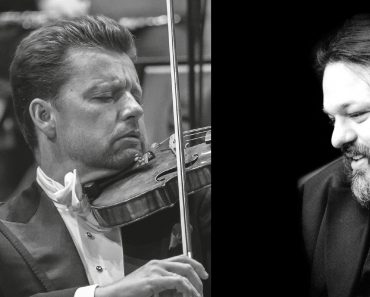This page is also available in / Cette page est également disponible en:
![]() Francais (French)
Francais (French)
Echoes of some of the most singular and intriguing contemporary music written by Canadian and international composers will resonate this spring in Toronto’s Koerner Hall and St-Trinity’s Centre. Presented by Esprit Orchestra, Canada’s only professional orchestra entirely devoted to the performance of new music, the aptly named Edge of Your Seat festival gathers emerging and established creative voices over the course of seven nights between March 4 and April 17.
Yet, one of the unquestionable highlights of Esprit’s upcoming season will come as a Prelude Concert, warming up the public before the festival takes off. Its opening piece: Runner by famed American minimalist, Steve Reich.
“Structurally, Runner goes back to my earliest works,” Reich said in an interview with La Scena Musicale. Set for a large, 19-piece ensemble divided in two groups of identical parts (woodwinds, vibraphone, piano, and string quartet) with double bass, Runner uses techniques featured prominently in Reich’s compositions. “This instrumentation allows the possibility of interlocking canons, which have been a building block of my music since the beginning,” he explains.
Written in 2016 and premièred in London, U.K., with choreography by Wayne McGregor and dancers of the Royal Ballet, the work exudes freshness and optimism. “I remember the upbeat feeling I had when I began composing the piece. I started improvising on a rapid sixteenth-note pattern; I wanted to enjoy myself and see where it goes,” recalls Reich.
Celebrating over four decades of exceptional musical creation, Nonesuch Records is releasing a complete box set of Reich’s recordings on March 14. “I’m very pleased at how well it was done. People can now have a view of how my music has developed from It’s Gonna Rain (1965) to Traveller’s Prayer (2021),” he says.
The opening night of the festival proper, titled Chasing Vito, features the North American premiere of Anemoi by Slovenian composer Vito Žuraj (pronounced “jouraille”). Co-commissioned by Esprit Orchestra and the Berlin Philharmonic, the title references eight wind deities in Ancient Greek mythology, each harnessing different natural powers. Written for symphony orchestra and a large set of percussive instruments such as crotales, slide whistle, anvil, or a ratchet—to name but a few—Žuraj carefully considered the orchestration and textures depicting each deity.
“Anemoi was inspired by Lyall Watson’s book Heaven’s Breath. Using it as a conceptual thread while composing the piece, I got the idea to define eight different materials and play with them in the form of the piece,” he says.
As an example, Žuraj characterized the fierce and aggressive north wind, Boreas, by using melodies in microtonal intervals inspired by old Greek songs on the oboes and the English horn to imitate the aulos, an Ancient Greek polyphonic wind instrument. Zephyros, the gentle and fruitful west wind, is depicted by adapting ancient lyre techniques for the harp.
Esprit also showcases homegrown talent, such as Canadians Julia Mermelstein and James O’Callaghan. Both have worked with Esprit and their conductor, Maestro Alex Pauk, on previous occasions and bring their affinity for electroacoustic music to their orchestral writing.
Mermelstein’s piece, Floral Reef, draws upon the influence of electronic-music artists such as Actress, Laurel Halo, and Biosphere. “I wanted to internalize and filter their sound through my own approach to writing for orchestra,” Mermelstein says. “Normally I gravitate to music that evolves slowly over time, allowing you to soak in the sounds. This piece is faster-paced, incorporating electronic influences while still retaining my own evolving language.”
In her electronic music, Mermelstein is interested in layering sounds and creating rich textures, sometimes to the point of white noise. “Exploring these ideas using acoustic instruments (allows you to) find an interesting mix where the two can meet,” she says, adding that collaborating with the Esprit Orchestra encourages her to take creative risks in exploring different techniques and types of sound.
O’Callaghan has a unique sensibility for words and storytelling through interdisciplinary media. “From a young age, I was an avid reader and I’ve written a lot of poetry and short stories,” he says. “I started studying film before I studied music, and part of me wants to try to get back to being a filmmaker,” he adds with a chuckle.
O’Callaghan’s interdisciplinary background informs the way he connects music to our personal contexts, culture, and environment. “Originally, this piece was intended for orchestra, multi-channel electronics and video,” he admits. Wanting to respect the conditions of writing for orchestra, O’Callaghan aimed to “address the amazing things an orchestra can do without all the interdisciplinary elements that I usually incorporate in my music. This project became an opportunity to challenge myself, focusing on orchestration and instrumental writing,” he says.
Titled Nothere, a play on words, O’Callaghan draws upon his electroacoustic background to create a guided auditory experience, encouraging different states of listening. “Even though there are no electronics in the piece, the thinking about sound remains the same. I work with anticipation and space for reflection—there are many very slow, quiet, delicate (moments) that lie below the surface, just barely audible.”
Esprit Orchestra’s winter season opens with Runner on Feb. 23 at Toronto’s Koerner Hall
www.espritorchestra.com
This page is also available in / Cette page est également disponible en:
![]() Francais (French)
Francais (French)








